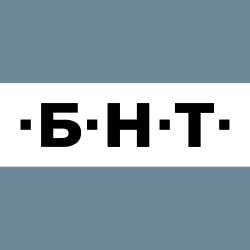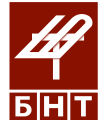Bulgarian National Television

 | |
 BNT headquarters in Sofia | |
| Type | Public broadcasting |
|---|---|
| Country | |
| Founded | 25 December 1959 |
| Headquarters | Ulitsa San Stefano 29, 1504 Sofia |
Broadcast area | Bulgaria and parts of its bordering countries |
| Owner | Republic of Bulgaria as a statutory corporation |
Key people | Emil Koshlukov (General Director) |
Former names | BT (1959-1992) |
Picture format | 576i (SDTV) 16:9 1080i (HDTV) 16:9 |
Official website | www |
| Language | Bulgarian |
The Bulgarian National Television (Bulgarian: Българска национална телевизия, Balgarska natsionalna televizia) or BNT (БНТ), stylized as ·Б·Н·Т· since 2018, is a public television broadcaster of Bulgaria. BNT was founded in 1959 and started broadcasting on December 26 of the same year.[1] It was the first television service to broadcast on the territory of Bulgaria.
BNT is a member of International Radio and Television Organisation (to 31 December 1992), European Broadcasting Union (from 1 January 1993), EGTA, IMZ, CIRCOM Regional, FIAT and BBLF.
History
[edit]
The first television broadcast in Bulgaria was in 1959. The archive had recorders, photos and movies which were open to the public from the end of the 1950s and the beginning of the 1960s. From 1964, BNT began broadcasting news, programmes and movies in monochrome to serve the rising number of viewers in Bulgaria. [3]
BNT began broadcasting in colour in 1973 using the French SECAM colour system after series of experimental broadcasting since 1969. The second channel, BT2, saw its emergence the following year.
From 1975, the first video recordings using the 2-inch format were made. In 1977, a broadcasting and program archive was created. In 1983, recorders with one-inch tape were made. The end of the 2-inch era was in 1984.
The year 1991 was very important for Bulgarian National Television. All records started to be recorded on computer and digitized for better quality, and available in a variety of other formats, and it switched from SECAM to the more widely used PAL. BT1 and BT2, were renamed as "Kanal 1" and "Efir 2", respectively. In 1992, an archive was created with more than 2,000 photos and 33,000 documents. The year 1999 saw the foundation of TV Bulgaria (now BNT 4), BNT's satellite television.
The 2010 FIFA World Cup became the first sports event broadcast in HD format. Since March 2012, BNT has been broadcasting in 16:9 format. On 6 February 2014, BNT started broadcasting its own HD channel – BNT HD (which was renamed in 2018 as BNT 3).
Channels
[edit]The Bulgarian National Television broadcasts on four different themed channels:
- BNT 1 – a 24-hour channel with national significance
- BNT 2 – cultural-based channel that offers a variety of programmes covering all aspects of day-to-day life of the Bulgarian people, culture, arts, sports, entertainment, films, series and regional programming
- BNT 3 – sport-based channel
- BNT 4 – broadcasts internationally and provides cultural and informative content produced in Bulgaria
Outside of Bulgaria, only BNT 4 is available to watch over the internet. However, BNT 1, BNT 2 and BNT 3 channels are watched over the internet only in Bulgaria due to their broadcasting rights. Attempting to watch BNT 1, BNT 2 and BNT 3 channels outside of Bulgaria, the test card on the website will result in the English text "This broadcast is limited only for the territory of Bulgaria.".
BNT operates four regional broadcasting centers, based in Blagoevgrad, Varna, Plovdiv and Ruse.
Mission, values and goals
[edit]BNT operates in accordance with the Radio and Television Act.[4] Under the Act, BNT is a legal entity based in Sofia and it is the national public service broadcaster and communications operator. As a public service broadcaster, the main purpose of BNT is to deliver a broad range of news and programming that keeps its audience informed about important issues and events in the areas of politics, economics, business, culture, science and education. Through its programming policy, BNT protects national interests and values, science and education; and represents the cultural heritage of all Bulgarian citizens, irrespective of their ethnicity. BNT caters for the diverse ideas and beliefs within society by reflecting the many different points of view and encouraging mutual understanding and tolerance in the relations between people. BNT has the commitment to produce a broad spectrum of national and regional programmes including ones about other countries, societies and cultures around the world; programmes that meet the needs of Bulgarian citizens whose mother-tongue is not Bulgarian, by the inclusion of original content in their own language; and programmes that keep Bulgarians living abroad up-to date with events in their home country.
Logos
[edit]- First BNT standalone logo used 1959–2008
- Previous BNT logo from 2008 to 2018
- BNT Logo (2018-)
- BNT 1 Logo (2018-)
- BNT 2 Logo (2018-)
- BNT 3 Logo (2018-)
- BNT 4 Logo (2018-)
References
[edit]- ^ "About Us". Archived from the original on 2018-06-12. Retrieved 2020-03-28.
- ^ "БТ-СОФИЯ - BT Sofia Bulgarian TV test card 1988". 31 May 2009 – via www.youtube.com.
- ^ "Българска национална телевизия, БНТ — Предавател България".
- ^ "Radio and Television Act".
External links
[edit]![]() Media related to Bulgarian National Television at Wikimedia Commons
Media related to Bulgarian National Television at Wikimedia Commons
- Official website (in Bulgarian)


